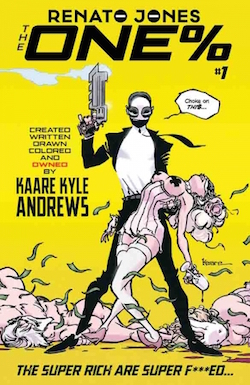Thursday Comics Hangover: Class war is hell
The illustrations in the new comic from Kaare Andrews, Renato Jones The One%, resemble Frank Miller’s artwork — particularly from his Dark Knight Returns era. Throughout, you'll find chiaroscuro layouts and plenty of exaggerated, pinched facial expressions. Andrews has bitten Miller’s style in just about every way imaginable. But Andrews’s art, once you look deeper than the surface, doesn’t really have any life to it; his art resembles Miller’s without the years of hard labor that made Miller such an icon. It’s got all the pizzazz and energy of a pencil sketch on a piece of tracing paper.

The book gets worse when you start reading what’s inside the word balloons. The first issue of Renato Jones is the titular character’s origin story, which is a riff on Batman: when he’s a child, Jones’s wealthy parents are killed in a home invasion. With the help of an older family friend, a hardcore Alfred Pennyworth figure named Church, Jones declares war on the corrupt wealthy even as he pretends to be an idle one-percenter in his secret identity. (Presumably, Andrews has some twists in store, because this premise is so clearly a rip-off of standard comics tropes that it’s embarrassing.) Here’s a passage from early in the comic, broken up in captions over a silhouette of Jones standing with a comically large gun:
For twenty years, they’ve been murdering the working class. Decimating wages, destroying benefits and killing jobs. They’ve crashed the economy, destroyed families and stolen their homes. They’ve turned the middle-class poor and the poor into convicts. Still you won’t find any of THEM serving time. The “ONEs” have bought their way out of judgment. With that kind of money, that kind of power, how can anyone stop them? How can anyone make them pay? Who will make them pay?!
Okay. I’d argue it’s been forty years and not twenty, but most of the first part of that quote is correct: the wealthy have changed the contract for working-class Americans, and our current economy is unsustainable. What Andrews is playing with here is populist outrage, which is obviously a correct reading of the American political climate. Look at the support that Bernie Sanders (or, hell, Donald Trump) has garnered and you’ll see an America that is fed up with income inequality and its attendant political inaction. But Andrews’s sausage-fingered attempts to capitalize on this divide are laughable, and though he’s seemingly coming at it from the more liberal side of the aisle, Andrews brings all the wit and grace of a Sean Hannity to the political conversation.
Jones’s first target is Douglas Bradley, a “Hedge fund manager and self-described philanthropist” who hosts Jones on a “yacht” that is drawn to look more like a cruise ship. Bradley is so obviously a bad guy that he might as well shoot a child in the head the first time we see him. He cozies up to Jones immediately, saying “Let’s hit the hot tub, dude. Talk some GMOs. This hybrid crop shit isn’t gonna solve world hunger, dude, it’s gonna monetize it.”
If that’s not a clear enough indicator that he’s a bad guy, soon Douglas is kicking a maid in the stomach, telling Jones “they’re not even people. Not at ten dollars an hour, dude.” Then, Douglas sees Jones’s alter ego, a gun-wielding hit man named The Freelancer, murdering his staff, and he’s in disbelief: “Thought this dude was a fairy tale,” Douglas says, “Like government regulation.”
Eventually, we learn that Douglas is even worse than Andrews has led us to believe. (Which is remarkable, considering he starts at reprehensible and only gets worse from there.) And then we learn Renato Jones’s catchphrase when he blows away the bad guys: “Choke on thi$.” Yes, with the dollar sign. No, I’m not sure how “thi$” is pronounced, though I like to picture it as the chime on an old-timey cash register as it opens.
Let’s lay this out as clearly as possible: Renato Jones is a terrible comic. Andrews’s art is punishingly ugly, his dialogue trots past laughable into cringeworthy territory, and the story mangles serious issues with what seems to be a dunderheaded earnestness. I’m not saying that class warfare is a bad idea for a comic — hot-topic political issues have always blended well with comics, ever since the days when Captain America decked Hitler on the cover of his first issue, back when America was trying its damndest to stay out of World War II.
But this hideous book wants to have it both ways. It wants to claim the moral high ground on income inequality while also glamorizing the extravagance of western hyper-violence. It wants to rage against the corporate machine while blatantly ripping off corporate superheroes like Batman and the Punisher. It wants to address economic topics without actually having to talk about economics. And it wants to profit on the zeitgeist-y loathing of the status quo while promoting an aesthetic that celebrates the worst of the last four decades of mainstream comics. If I could describe Andrews’s style in one word, it would be Reaganomics: it’s bloated and shallow, ahistoric and nihilistic, gaudy and vapid. This is a serious contender for the worst comic book of 2016.